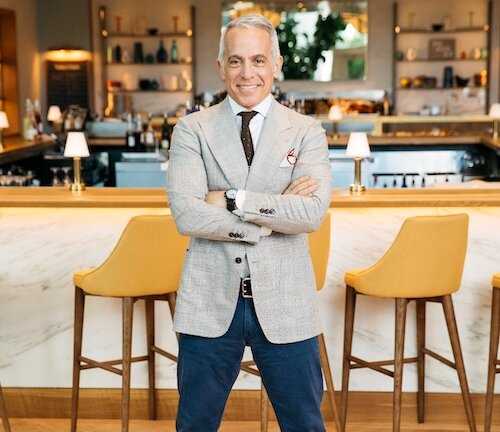A Restaurateur, a Winemaker and a Sommelier Share Why They Love Rosé
Rosé all day. That phrase is one of the most popular with Instagram influencers, brunch buddies, and bachelorettes who see it as part lifestyle and part rallying cry. But, while rosé wine might have the reputation as a "girly" beverage, rosés are having a moment with people who seek a crisp, fine wine that can make any casual day into a celebration. Rosé is also meant to be enjoyed by everyone and not just in the summer and the approachability and versatility of rosé has caught the attention of chefs, winemakers and sommeliers. We reached out to strong advocates of rosé to get their picks and tips.
Geoffrey Zakarian. Photo credit to Key Group Worldwide
Restaurateur and Food Network celebrity chef, Geoffrey Zakarian is known for his love of rosé wine. His restaurants famously offer sophisticated rose brunches, and he can often be seen with a glass of rosé in hand. Zakarian's connection to the wine goes back decades to when he was working as a chef in Paris. "I started drinking rosé 30 some years ago. When I worked in France it was a normal thing to drink, then when I came back [to the United States], I was shocked at how much less people served it.
Zakarian says that a good rose also needn't break the bank. "Rosé has always been less expensive because it has added sugar. It is very economical." The chef and author adds that a good rosé can be purchased for about $25. Whispering Angel from Provence and Alexis Lichine from Bordeaux are two French examples that Zakarian recommends. Serving it at the right temperature is also key. Zakarian says rosé is best when cold. "Rosé should be served at 44 degrees." That says Zakarian is the only rule. Rosé goes well with food, especially Mediterranean dishes, and is equally good on its own. "It's an anytime drink, adds the chef.
Winemaker Donae Burston also fell in love with rosé while in France, where everyone drinks the liquid. The former spirits executive for Moët Hennessy USA was on a business trip in the South of France, when he met the owner of Domaine Bertaud Belieu, the oldest vineyard on the Saint Tropez peninsula. They got to talking and Burston decided to start a rosé brand that would break the stereotype of the wine. "I see the ads and they all are filled with women in flowy white dresses. I didn't understand that. It's almost like making rosé trivial."
He said that he had friends who, after buying into to the marketing campaigns, wouldn't drink rosé because, "it's for girls". That's when Burston decided to make a rosé wine that would cater to - and benefit -- the Black community. "I wanted to shake up the industry. I wanted to get rid of all that stereotype and go in the opposite direction."
The first order of business was to taste hundreds of rosé to see what notes he liked and didn't like. "I was drunk by the 30th one," he playfully recalls. "I didn't want something that was too light and pink. On the other hand, I didn't want something that was too heavy." Then, he went back to Domaine Bertaud Belieu to discuss his findings with the grower. "The wine has a lot of fruit, with a long finish. It's an easy drinking wine." That was back in 2017. In December 2018, he did a small test run, and in December 2019, La Fete du Rosé ($23.99) was officially launched. A few months later, a global pandemic hit.
La Fete du Rose. Courtesy
Realizing that people were sitting at home and (probably) needed some good wine, he started selling direct to consumers on his website in addition to distributing in stores. In addition, Burston donates a portion of proceeds for every bottle sold to various programs that provide travel opportunities to underserved and underrepresented youth. The wine with a purpose was a hit.
Burston says he wants the world to know that rosé is a real wine. "It's as real as chardonnay and it should be drunk as such." His suggestion for drinking his wine? "Pair it with a great cigar. Let's make that the norm."
Allegra photo credit to Vinya Wines
Allegra Angelo, sommelier at Vinya Wine in Miami, wants red wine drinkers to think outside the box and try some rosé. For them, she recommends rosé that are full-bodied. "A lot of drinkers are afraid of the darker styles of rosé, but color equals flavor." She suggests Purple Rose by Castello di Ama ($22), a blend of Sangiovese and Merlot "Castello di Ama has been making this iconic rosato since the early 1980s and it unlocks the best of Tuscany. Angelo likes the wine for its big notes of dark cherry, safe, and terra cotta earth. And, unlike crisp roses from France, Angelo recommends serving the rosato a bit warmer, at 50 - 55 degrees in a burgundy glass. "I really love the way it pairs with richer foods like smoked salmon, quail, or pork."
Another rosé for red lovers is the Pinot Noir Rose by County Line Radio ($25). Angelo says she loves this rose, "because it clearly tastes like Pinot Noir -- perfectly dry and tart with white cherry, plum, and nectarine".
Maybe that "rosé all day" catchphrase should be changed to "rosé every day.” Instagrammers, start a hashtag!






